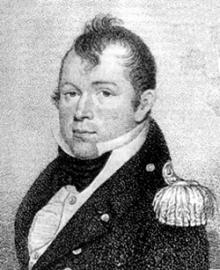- COVID-19 Project
- Home
- Archival Material
- College History Projects
- Subject-Based Digital Projects
- Carlisle Indian School Resources
- LGBT History Project
- Three Mile Island (TMI) Resources
- Civil War Resources
- James Buchanan Resources
- Slavery and Abolition in the U.S.
- Russian and Slavic Resources
- AIFS / AIFS Foundation Collection
- Books of Isaac Norris
- Writings by Dickinsonians
- Digital Images on Flickr
- Dickinson @ Internet Archive
Jesse Duncan Elliot (1782-1845)

Jesse Elliot was born in Maryland on July 14, 1782. He was nine years old when his father was killed in an Indian attack; soon after young Elliot moved to Carlisle, Pennsylvania, where he received his schooling. After studying law for a time, he was appointed midshipman in the United States Navy in April 1804 and was assigned to the U.S.S. Essex. He became an acting lieutenant on the U.S.S. Enterprise and in April 1810 was promoted to permanent rank of lieutenant. At the outbreak of the War of 1812, he was posted to Lake Erie where he captured two armed British brigs, burning one, ostensibly in retaliation for the earlier British capture of Detroit. Becoming second in command under Oliver Perry, and captain of the U.S.S. Niagara, he took what was to become a controversial part in the battle of Lake Erie. Although Perry spoke very highly of Elliot in his official report and Congress decorated him, rumors of Elliot's animosity against his commander and observations from both British and United States experts that Elliot had not backed Perry's boldness as he should created a simmering controversy. Various accusations and cross accusations in the press, including a defense by James Fenimore Cooper, resulted in Elliot challenging Perry to a duel and then facing a court-martial, a situation that the Cabinet desperately wished to avoid. The fact that Elliot was a strong Jacksonian unafraid to recruit powerful political support and to spar with the Whig press ensured that the dispute would never be forgotten, even after both men were dead.
In fact, controversy punctuated Elliot's career. He was with Decatur in the Algiers Campaign in 1815 commanding the sloop U.S.S. Ontario, and three years later won promotion to post-captain, the highest permanent rank then existing in the Navy. He went on to command the West Indies Squadron between 1829 and 1833 and was then assigned as Commandant of the Boston Naval Yard. The famous U.S.S. Constitution was undergoing a thorough refit at this time, and Elliot infuriated the local population by mounting a new figurehead on the old ship in a full-length likeness of Andrew Jackson, a vilified figure in the solidly Whig city. In August 1835, with new figurehead firmly attached, Elliot took command of the Constitution as Commodore of the Mediterranean Squadron on a three year cruise to promote American interests in the region. His command did not go smoothly. The Secretary of the Navy Mahlon Dickerson had to remind him of a departmental order of June 1834 that no naval officer should accept gifts from foreign representatives. Other concerns finally led to his trial by court martial in June 1840, and his suspension from the Navy without pay for four years. Elliot was a trustee of Dickinson College from 1831 to 1833, and in 1836 he wrote to the Board that he intended to donate a collection of coins and "specimens of antiquity." Whether these items were collected in the Mediterranean or not is unknown, but they are still housed at Dickinson College.
In October 1843, at the order of the president, Elliot was returned to duty early and given command of the Philadelphia Naval Yard. He died in that city on December 18, 1845. His son Washington Lafayette Elliot, whom he had taken with him on the Constitution at the age of seven, attended Dickinson with the Class of 1843 and went on to a distinguished Army career.
Date of Post:
2005
College Relationship:
Trustee - Years of Service:
1831-1833